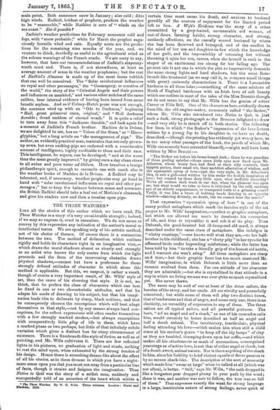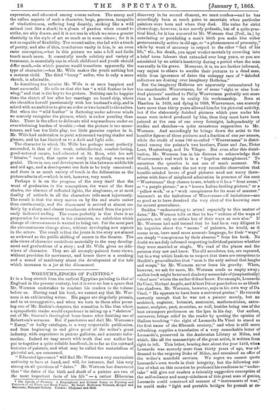THE THREE WATCHES.*
LIKE all the stories of this author which we have read, The Three Watches is a story of a very considerable strength ; indeed, if we may so express it, cruel in execution. We do not mean to convey by this expression any indication of the author's moral or intellectual tastes. We are speaking only of his artistic method, not of his choice of themes. Of course there is a connection between the two. The method of delineation which outlines rigidly and holds its characters tight in an imaginative vice,— which draws the moral shadows almost as clearly and strongly as an artist who knows the only centre from which the light proceeds and the form of the intervening obstacles draws physical shadows,—cannot but have a preference for those strongly defined attitudes of character to which alone this method is applicable. But this, we suspect, is rather a result, though of course a very important result, of Mr. Wills' style of art, than the cause of his choosing that style. It is not, we think, that he prefers the class of characters which can best be fixed in one or two characteristic attitudes, and that he adapts his mode of drawing to his subject, but that his imagi- nation leads him to delineate by sharp, black outlines, and that he consequently chooses the conceptions which will best adapt themselves to that style,—not by any means always hard con- ceptions, for the softest expressions will often render themselves with a few strongly marked strokes,—but always conceptions with comparatively little play of life in them, which have a marked phase or two perhaps, but little of that infinitely subtle variation which gives a distinct hue for every circumstance of existence. There is a Rembrandt-like style of fiction as well as of painting, and Mr. Wills cultivates it. There are few reflected lights in his pictures, no graduation of light and shade, nothing to rest the mind upon, when exhausted by the strong tension of his design. Hence there is something dream-like about the effect of all his stories, as in those dreams in which you have a night- mare sense upon you that you must not stray from a particular line of facts, though it strains and fatigues the imagination. Thus Notice to Quit was the story of a selfish man, suddenly and unexpectedly told of an aneurism of the heart which within a • The Three Watches, By W. G. Wills. Three volumes. Loudon : Hurst and Motets. lees.
certain time must cause his death, and anxious to husband greedily all the sources of enjoyment for the limited period
left to him. 14 Wife's Evidence was .the story of a crime committed by a grey-haired, unvenerable old woman, of out-of doors, farming habits, strong character, and strong,
motherly affections, on the rascally second husband by whom she has been deceived and betrayed, and of the conflict in the mind of her son and daughter-in-law which the knowledge of her guilt, and the impossibility of screening her without throwing it upon her son, causes, when she herself is sunk in the stupor of an excitement too strong for her failing age. The present tale is not one in which the plot so imperatively demands the same strong lights and hard shadows, but the same Rem- brandt-like treatment (as we may call it, to compare small things with great) eminently characterizes it. There is a Lancashire hardness in all these tales ;—sornething of the same mixture of North of England harshness with an Irish love of soft beauty which one notices in most of the tales of the Miss Brontds though we do not mean to say that Mr. Wills has the genius of either Curror or Ellis Bell. One of the characters here, evidently drawn from life, the old engine-maker, commonly called " the Stoker," whom Mr. Wills also introduced into Notice to Quit, is just such a dark, strong photograph as the Brontes delighted to draw —and very ably he is struck off in both stories. The following few lines, in which " the Stoker's " impression of the love-letters written by a young fop to his daughter is, we have no doubt, described,—(though the printing has evidently got wrong here, as in too many other passages of the book, the proofs of which Wills can scarcely have corrected himself),—might well have been written by Miss Broad :—
" The Stoker sat beforo his brass-bound desk ; there he was guardian of those gosling epistles—those stern little eyes now fixed upon Mr. Atherton, whose weary face had fired at their silly contents, their hippish pathos, their small wit, their snobbish affectation of wisdom, and the squeamish syrup of love—just the very style, in Mr. Atherton's idea, to suit a girl—and written by him under the foolish inspiration of love; but conned by these fiery little eyes, what ineffable absurdity! We've all written such trash in our day, when the glamour• was upon us; but what would we take to have it criticized by the cold, sardonic eye of an elderly acquaintance, or trumpeted forth to a grinning court? Verily, it was like a brace of bobbing heads dancing in an opposite window—dancing divinely, no doubt, but we cannot hear the music."
That expression "squeamish syrup of love" is one of the many perfect metaphors which mark the incisive style of the art proper to Mr. Wills' imagination,—perfect as graphic metaphors, but which are allowed too much to dominate his conception of life, and thus to crystallize it and rob it of its play. Thus Deborah, the good-hearted but ill-tempered old maid, is always described under the same class of metaphors. She indulges in "wintry coaxings,"--one knows well what they are,—to her half- brother in his childhood ; she has a" sleety pity" in her eyes for his affianced bride under impending misfortune ; while the latter has been told by him " to take a friendly grip of the honest old nettle, and I warrant she won't sting." All these metaphors are sharp and true,—but their graphic force has too much mastered Mr.
Wills' imagination, in which Deborah is little more than an essence evolved from them. For one attitude of her character
they are admirable ;—but she is crystallized in that attitude in a way in which no living woman was over qttite so much crystallized yet. She never thaws.
The same may be said of one at least of the three sailors, the heroine of the story, and her uncle. All are vividly and powerfully conceived ; but while some of them will play two distinct tunes, that of tenderness and that of anger, and some only one, there is no elasticity, no versatility of expression in any of them. The three sailors are all typical sailors, and all powerful pictures. The hero, "arf an angel and arf a shark," as one of his comrades calls him, would certainly be better described as half an angel and half a dumb animal. The involuntary, inarticulate, physical feeling attending his love—which makes him when still a child crave at his mother's grave " to keep off the big lumps " of clay as they are tumbled, thumping down upon her coffin,—and which makes all his attachments as much of unconscious, unrecognized yearnings as of active love, is not that of either angel or shark, but of a dumb, sweet, animal nature. Nor is there anything of the shark in him, since his liability to brief violent squalls of fierce passion is by no means shark-like. The description of the sort of necessity which made him " swear at large" when he talked at all (which was
not often), is better. "Still," says Mr. Wills, "the oath dropped in like a bergamot pear dropped plump in your path by the wind ; there it was, and another was sure to follow, the tree was so full of them." That expresses exactly the want for strong language in a large, inarticulate nature of strong feelings, never quick of
expression, and educated among coarse sailors. The sunny and the sullen aspects of such a character, large, generous, incapable of vindictiveness, suffering long 'dumbly, striking like a wild animal (not like a shark) in a gleam_ of passion when roused to strike, are ably drawn, and it is not one in which we miss a greater elasticity in the style of art so much as in some others ; for it is not so capable of flexibility. The second sailor, the lad with a touch of poetry, and also of thin, treacherous vanity in him, is an even rarer conception,—but in this picture we miss a full and facile touch much more. It essentially needs subtlety and variety of treatment, is essentially one in which childhood and youth- should differ much, in which passion would transform apparently the type of character ;—but Mr. Wills makes the youth nothing but a maturer child. The third " boozy " sailor, who is only a mere sketch, is admirable.
In describing the heroine Mr. Wills is at once happiest and least successful. He tells us that she has " a wild feather in her wing," and that is the key to his picture. Nothing can be happier than the sketch of her after her marriage on board ship, where she identifies herself passionately with her husband's ship, and is seized with an ambition to give an order or two herself to the sailors. But when the " wild feather" is fluttering under adverse winds we scarcely recognize the picture, which is rather puzzling than false. There is the effort to delineate wild waywardness under an overwhelming burden of trouble ;—but the picture is too mono- tonous, and has too little play, too little genuine caprice in it. Mr. Wills had undertaken to paint a thousand varying shades and gleams, and he has limited us to a dark and light side.
The character in which Mr. Wills has perhaps most perfectly succeeded, is that of the weak, unintellectual, comfort-loving, good-natured curate, half-educated at St. Bees, with his soft " bivalve " heart, that opens so easily to anything warm and genial. There is, too, real development in him between middle life and old age, and a development one feels to be truly conceived ; and there is as much variety of touch in the delineation as the picture admits of,—which is not, however, very much.
Perhaps it is on the progress of the story itself that the want of graduation in the conceptions, the want of the finer shades, the absence of reflected lights, the singleness, or at most duality of attitude in all the characters tells most injuriously. The result is that the story moves on by fits and starts rather than continuously, and the ddsouement is arrived at almost un- fairly by a sharp and almost treacherous rebound from the previ- ously indicated ending. The cause probably is that there is no preparation for movement in the characters, no subtleties which change of circumstances is wanted to bring out. For the most part the circumstances change alone, without developing new aspects in the actors. The result is that the joints in the story are almost as awkward as the public shifting of scenes in the theatre. The side-views of character contribute materially to the easy develop- ment and graduations of a story ; and Mr. Wills gives no side- views of character. They are all strongly-painted front-views, without provision for movement, and hence there is a creaking and a sound of machinery about the development of the tale which increases to a jar at the denouement.





































 Previous page
Previous page